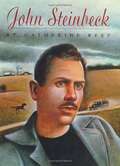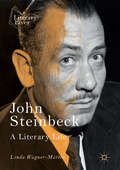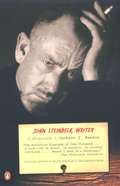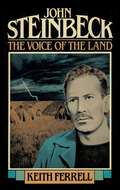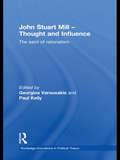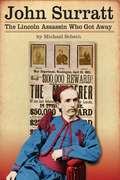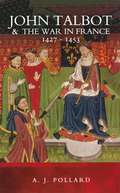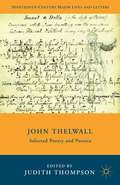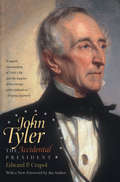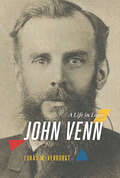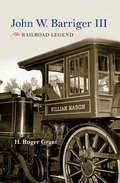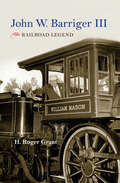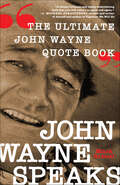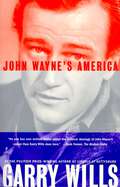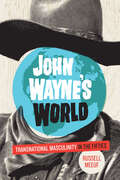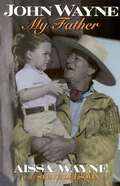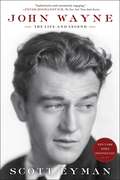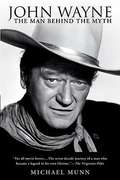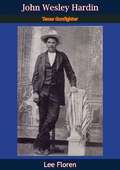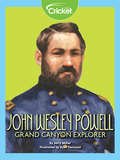- Table View
- List View
John Steinbeck
by Catherine ReefJohn Steinbeck wrote about life in America from the early twentieth century through the turbulent 1960s. A natural storyteller, Steinbeck combined firsthand experience, direct observation, and his belief in human goodness in stories that show deep feeling for common, working people. Whether describing displaced Dust Bowl farmers in his Pulitzer Prize-winning novel, The Grapes of Wrath; Mexican Americans in Tortilla Flat; or the colorful denizens of Monterey's Cannery Row, he created characters and events that are part of the nation's cultural and historical heritage. In search of stories to tell, Steinbeck traveled America's farm roads and highways, explored Mexico and Europe, and got to know migrant workers, soldiers, presidents, and a king. He wrote about a variety of subjects in many forms: novels, short stories, plays, film scripts, and newspaper and magazine articles. But John Steinbeck always wrote with a keen interest in Americans and their world, and with the same purpose: "My whole work drive has been aimed at making people understand each other." This fascinating biography interweaves Steinbeck's experiences and excerpts from his writings, highlighting his skillful transformation of significant historical and social events into classics of American literature. Photographs of the writer, his subjects, and the America they experienced make John Steinbeck a vivid chronicle of an important modern author and an extraordinary time in history.
John Steinbeck
by Linda Wagner-MartinThis book aims to both describe and analyze the way Steinbeck learned the writing craft. It begins with his immersion in the short story, some years after he stopped attending Stanford University. Aside from a weak first novel, his professional writing career began with the publication in 1932 of The Pastures of Heaven, stories set in the Salinas Valley and dedicated to his parents. From that book he wrote truly commanding stories such as The Red Pony. Intermixed with Steinbeck's journalism about California's labor difficulties, his writing skill led to his 1930 masterpieces, Of Mice and Men, In Dubious Battle, and The Grapes of Wrath. The latter novel, winner of the Pulitzer Prize for Fiction in 1940, led eventually to his being awarded the Nobel Prize for Literature in 1962. He continued producing such wide-ranging works as The Pearl, East of Eden, The Winter of Our Discontent, and Travels with Charley up to just a few months before his death in 1968.
John Steinbeck, Writer: A Biography
by Jackson J. BensonDrawing on John Steinbeck's papers and photographs, and scores of interviews, Jackson J. Benson explores the influences that contributed to Steinbeck's archetypal sense of American culture and his controversial concerns. An in-depth study of the shy, private individual behind many American classics.
John Steinbeck: The Voice of the Land
by Keith FerrellJohn Steinbeck was born in 1902 in California&’s Salinas River Valley. Although he worked briefly as a reporter in New York, it was in the Salinas Valley that he spent the Depression years, and his experiences and the people he met became the basis for his books. Of Mice and Men opened the eyes of the public to the desperate lives of the migrant workers. The Grapes of Wrath told the story of the destitute Oklahoma dust bowl farmers who flocked to the Valley in search of work, Cannery Row painted the rough and tumble lives of the cannery workers in nearby Monterey. And East of Eden, his most personal novel, revolved around the lives of two families from the Valley whose story was a tragic metaphor for the suffering humans needlessly cause one another.Steinbeck was the recipient of both the Nobel and Pulitzer Prizes for Literature and was named to the American Academy of Arts and Letters and the National Institute of Arts and Letters. His books were likewise embraced by the public—many reached the top of the bestseller lists; four of them were made into Broadway shows; and six were made into movies.Despite these successes, he often doubted his abilities. The critics were seldom kind to him, making his doubts grow. But at the end of his life he realized that by championing the causes of the underprivileged, he had made a lasting impression on the social consciousness of America. He died in New York in 1968.Keith Ferrell gives us a fascinating account of John Steinbeck, a writer who continually struggled to awaken America&’s social conscience. Steinbeck&’s ability to incorporate the dark side of life in rich stories of human strength has captured the souls of millions of readers everywhere.
John Stewart Collis: A Memoir
by Richard IngramsJohn Stewart Collis was a remarkable writer about nature in the tradition of W. H. Hudson and Richard Jefferies. He was born in Dublin; after Rugby and Oxford he became a farm labourer during the war--an experience which inspired his book "The Worm Forgives the Plough, "now widely regarded as a classic. He wrote a number of books about scientific phenomena but only achieved recognition with the publication in the 1970s of his autobiography, "Bound Upon a Course." After a lifetime of misfortune and neglect, his last years were a period of great happiness and fulfillment. He married again and became a regular contributor to the Spectator. Richard Ingrams was a close friend of these years; he has written a perceptive, affectionate account of a formidably unusual man whose unique personality is the stuff of great biography.
John Stuart Mill - Thought and Influence: The Saint of Rationalism (Routledge Innovations in Political Theory)
by Georgios VarouxakisMore than two hundred years after his birth, and 150 years after the publication of his most famous essay On Liberty, John Stuart Mill remains one of the towering intellectual figures of the Western tradition. This book combines an up-to-date assessment of the philosophical legacy of Mill’s arguments, his complex version of liberalism and his account of the relationship between character and ethical and political commitment. Bringing together key international and interdisciplinary scholars, including Martha Nussbaum and Peter Singer, this book combines the latest insights of Mill scholarship with a long-term appraisal of the ways in which Mill’s work has been received and interpreted from the time of his death in 1873 to today. The book offers compelling insights into Mill’s posthumous fate and reputation; his youthful political and intellectual activism; his views on the formation of character; the development of his thought on logic; his differences from his father and Bentham; his astonishingly prescient, environmentally sensitive and ‘green’ thought; his relation to virtue ethics; his conception of higher pleasures and its relation to his understanding of justice; his feminist thought and its place in contemporary debates and feminist discourses; his defence of free speech and its fundamental significance for his liberalism; and his continued contemporary relevance on a number of major issues. This book will be of interest to students and scholars of Politics, Political Theory, Philosophy, History, English, Psychology, and also Cultural Studies, Empire studies, nationalism and ethnicity studies.
John Surratt: The Licoln Assassin Who Got Away
by Michael ScheinWho was JOHN SURRATT? A pitiless assassin who hid while his mother was hanged for his crime? A Southern patriot falsely accused of Lincoln's murder? This is the last untold story of the Lincoln assassination - an impeccably researched page-turning account of the Confederate spy who was Booth's closest associate prior to the assassination; the man who carried orders from Richmond to Washington, then got away with the crime of the century. Get ready for a thrilling ride through a treacherous conspiracy and a spectacular worldwide flight from Ford's Theatre to the Vatican in Rome, Italy where Surratt managed to hide under an alias as a Papal Zouave. You will be hot on the trail of the forgotten conspirator who may be the missing link between Jefferson Davis and Lincoln's death. Your ride will take you with Surratt, back to America and to a courtroom in Rockville, Maryland to witness the trial that captured the attention of the nation. One hundred fifty years in the making, this is the one history book you can't put down..
John Talbot & the War in France, 1427–1453
by A. J. PollardJohn Talbot, Earl of Shrewsbury was the last of the celebrated English commanders of the Hundred Years' War. In his lifetime his reputation for audacity and courage gave him an unrivalled fame among the English, and he was feared and admired by the French. A.J. Pollard, in this pioneering and perceptive account, reconstructs the long career of this extraordinary soldier and offers a fascinating insight into warfare in the late medieval period. Talbot was the last representative of generations of brave, brutal warriors whose appetite for glory and personal gain had sustained English policy in France since the time of Edward III. His defeat and death at the Battle of Castillon on 17 July 1453 marked the end of the wars. It was also the final act in a heroic but savage tradition.
John Thelwall Selected Poetry And Poetics
by Judith ThompsonDrawing on newly-discovered manuscripts, this collection is the first modern edition of poetry by John Thelwall, the famed radical Romantic and champion of the working class. Eight key essays and 125 fully-annotated poems introduce his work in correspondence with historical traditions and current critical paradigms.
John Tyler, the Accidental President
by Edward P. CrapolThe first vice president to become president on the death of the incumbent, John Tyler (1790-1862) was derided by critics as "His Accidency." In this biography of the tenth president, Edward P. Crapol challenges depictions of Tyler as a die-hard advocate of states' rights, limited government, and a strict interpretation of the Constitution. Instead, he argues, Tyler manipulated the Constitution to increase the executive power of the presidency. Crapol also highlights Tyler's faith in America's national destiny and his belief that boundless territorial expansion would preserve the Union as a slaveholding republic. When Tyler sided with the Confederacy in 1861, he was branded as America's "traitor" president for having betrayed the republic he once led.
John Tyler: Tenth President Of The United States
by Lucille Falkof Richard G. YoungPresents the life of John Tyler, including his childhood, education, employment, and political career.
John Venn: A Life in Logic (Studies In History And Philosophy Of Science Ser. #56)
by Lukas M. VerburgtThe first comprehensive history of John Venn’s life and work. John Venn (1834–1923) is remembered today as the inventor of the famous Venn diagram. The postmortem fame of the diagram has until now eclipsed Venn’s own status as one of the most accomplished logicians of his day. Praised by John Stuart Mill as a “highly successful thinker” with much “power of original thought,” Venn had a profound influence on nineteenth-century scientists and philosophers, ranging from Mill and Francis Galton to Lewis Carroll and Charles Sanders Peirce. Venn was heir to a clerical Evangelical dynasty, but religious doubts led him to resign Holy Orders and instead focus on an academic career. He wrote influential textbooks on probability theory and logic, became a fellow of the Royal Society, and advocated alongside Henry Sidgwick for educational reform, including that of women’s higher education. Moreover, through his students, a direct line can be traced from Venn to the early analytic philosophy of G. E. Moore and Bertrand Russell, and family ties connect him to the famous Bloomsbury group. This essential book takes readers on Venn’s journey from Evangelical son to Cambridge don to explore his life and work in context. Drawing on Venn’s key writings and correspondence, published and unpublished, Lukas M. Verburgt unearths the legacy of the logician’s wide-ranging thinking while offering perspective on broader themes in religion, science, and the university in Victorian Britain. The rich picture that emerges of Venn, the person, is of a man with many sympathies—sometimes mutually reinforcing and at other times outwardly and inwardly contradictory.
John Venn: A Life in Logic (Studies In History And Philosophy Of Science Ser. #56)
by Lukas M. VerburgtThe first comprehensive history of John Venn’s life and work. John Venn (1834–1923) is remembered today as the inventor of the famous Venn diagram. The postmortem fame of the diagram has until now eclipsed Venn’s own status as one of the most accomplished logicians of his day. Praised by John Stuart Mill as a “highly successful thinker” with much “power of original thought,” Venn had a profound influence on nineteenth-century scientists and philosophers, ranging from Mill and Francis Galton to Lewis Carroll and Charles Sanders Peirce. Venn was heir to a clerical Evangelical dynasty, but religious doubts led him to resign Holy Orders and instead focus on an academic career. He wrote influential textbooks on probability theory and logic, became a fellow of the Royal Society, and advocated alongside Henry Sidgwick for educational reform, including that of women’s higher education. Moreover, through his students, a direct line can be traced from Venn to the early analytic philosophy of G. E. Moore and Bertrand Russell, and family ties connect him to the famous Bloomsbury group. This essential book takes readers on Venn’s journey from Evangelical son to Cambridge don to explore his life and work in context. Drawing on Venn’s key writings and correspondence, published and unpublished, Lukas M. Verburgt unearths the legacy of the logician’s wide-ranging thinking while offering perspective on broader themes in religion, science, and the university in Victorian Britain. The rich picture that emerges of Venn, the person, is of a man with many sympathies—sometimes mutually reinforcing and at other times outwardly and inwardly contradictory.
John W. Barriger III: Railroad Legend (Railroads Past and Present)
by H Roger GrantIn John W. Barriger III: Railroad Legend, historian H. Roger Grant details the fascinating life and impact of a transportation tycoon and "doctor of sick railroads." After graduating from the Massachusetts Institute of Technology, John W. Barriger III (1899–1976) started his career on the Pennsylvania Railroad as a rodman, shop hand, and then assistant yardmaster. His enthusiasm, tenacity, and lifelong passion for the industry propelled him professionally, culminating in leadership roles at Monon Railroad, Pittsburgh and Lake Erie Railroad, Missouri-Kansas-Texas Railroad and the Boston and Maine Railroad. His legendary capability to save railroad corporations in peril earned him the nickname "doctor of sick railroads," and his impact was also felt far from the train tracks, as he successfully guided New Deal relief efforts for the Railroad Division of the Reconstruction Finance Corporation during the Depression and served in the Office of Defense Transportation during World War II. Featuring numerous personal photographs and interviews, John W. Barriger III is an intimate account of a railroad magnate and his role in transforming the transportation industry.
John W. Barriger III: Railroad Legend (Railroads Past and Present)
by H. Roger Grant“Readers will find in his biography an extraordinary tale of the travails of twentieth-century railroading through the career of this one man.” —The Annals of IowaAfter graduating from the Massachusetts Institute of Technology, John W. Barriger III (1899–1976) started his career on the Pennsylvania Railroad as a rodman, shop hand, and then assistant yardmaster. His enthusiasm, tenacity, and lifelong passion for the industry propelled him professionally, culminating in leadership roles at Monon Railroad, Pittsburgh and Lake Erie Railroad, Missouri-Kansas-Texas Railroad and the Boston and Maine Railroad. His legendary capability to save railroad corporations in peril earned him the nickname “doctor of sick railroads,” and his impact was also felt far from the train tracks, as he successfully guided New Deal relief efforts for the Railroad Division of the Reconstruction Finance Corporation during the Depression and served in the Office of Defense Transportation during World War II. Featuring numerous personal photographs and interviews, John W. Barriger III is an intimate account of a railroad magnate and his role in transforming the transportation industry.“Thanks to Roger Grant’s latest book, Barriger and his amazing legacy endures, waiting to be rediscovered by a new generation of readers. Trust me, you’ll learn a lot.” —Classic Trains“H. Roger Grant’s biography, John W. Barriger III, offers a new and much needed perspective on this prominent individual. Grant brings together an overview of Barriger’s career developments with an appropriate balance of insights into his early life and introduction to railroads.” —Journal of Transport History
John Wall (Amazing Athletes Ser.)
by Jon M FishmanJohn Wall's NBA dream came true when he was chosen by the Washington Wizards as the first overall pick in the 2010 draft. Coming in, John knew the Wizards had a losing record. Despite John's best efforts, they still struggled to win games for a few years. But by 2014-2015, the Wizards were finally a winning team, and John had become one of the best point guards in the game. Read about John's journey from his childhood in North Carolina to NBA stardom.
John Wayne Speaks: The Ultimate John Wayne Quote Book
by Mark OrwollWith more than 1,100 impeccably sourced quotes from throughout John Wayne's 172-film career, John Wayne Speaks: The Ultimate John Wayne Quote Book provides what has often been missing from other Duke Wayne reference books: accuracy, context, and comprehensiveness.These quotations offer a deep dive into Wayne’s films and acting persona—the iconic American man of action whose sense of values and decency are a veneer covering a boiling pot of determination, courage, outrage, and even violence. The quotes in John Wayne Speaks are at once inspirational, humorous, touching, and revealing.Author and veteran journalist Mark Orwoll has created an overlay of categories into which each quote fits, making the manuscript easy for readers to find the type of quote—or even the exact quote, footnoted to identify its film—they may be searching for. But John Wayne Speaks is more than just a collection of the actor's movie lines. Orwoll has researched and written an in-depth introduction to Wayne's film career to put the quotes in a broader context. Movie-lovers will also appreciate the author's opinionated capsule reviews and production notes from Wayne's complete filmography.John Wayne Speaks is the quote book that every fan of the Duke needs and a delightful addition to any cinephile’s library.
John Wayne's America
by Garry WillsThe Pulitzer Prize-winning author of Lincoln at Gettysburg brings his eloquence, wit, and on-target perceptions of American life and politics to this fascinating, well-drawn protrait of a twentieth-century hero. In this work of great originality-the biography of an idea-Garry Wills shows how John Wayne came to embody Amercian values and influenced our cultoure to a degree unmatched by any other public figure of his time. In Wills's hands, Waynes story is tranformed into a compelling narrative about the intersection of popular entertainment and political realities in mid-twentieth-century America.
John Wayne's World: Transnational Masculinity in the Fifties
by Russell MeeufIn a film career that spanned five decades, John Wayne became a U. S. icon of heroic individualism and rugged masculinity. His widespread popularity, however, was not limited to the United States: he was beloved among moviegoers in Asia, Africa, Latin America, and Europe. In John Wayne’s World, Russell Meeuf considers the actor’s global popularity and makes the case that Wayne’s depictions of masculinity in his most popular films of the 1950s reflected the turbulent social disruptions of global capitalism and modernization taking place in that decade. John Wayne’s World places Wayne at the center of gender- and nation-based ideologies, opening a dialogue between film history, gender studies, political and economic history, and popular culture. Moving chronologically, Meeuf provides new readings of Fort Apache, Red River, Hondo, The Searchers, Rio Bravo, and The Alamo and connects Wayne’s characters with a modern, transnational masculinity being reimagined after World War II. Considering Wayne’s international productions, such as Legend of the Lost and The Barbarian and the Geisha, Meeuf shows how they resonated with U. S. ideological positions about Africa and Asia. Meeuf concludes that, in his later films, Wayne’s star text shifted to one of grandfatherly nostalgia for the past, as his earlier brand of heroic masculinity became incompatible with the changing world of the 1960s and 1970s. The first academic book-length study of John Wayne in more than twenty years, John Wayne’s World reveals a frequently overlooked history behind one of Hollywood’s most iconic stars.
John Wayne: My Father
by Aissa WayneIn John Wayne: My Father, Aissa Wayne delves into her father's childhood, his film career, and his life off the screen. The result is an affecting portrait that offers a new perspective on one of America's most enduring hero's humanity.
John Wayne: The Life and Legend
by Scott EymanThe New York Times bestselling biography of John Wayne: &“authoritative and enormously engaging…Eyman takes you through Wayne&’s life, his death, and his legend in a detailed, remarkably knowledgeable yet extremely readable way&” (Peter Bogdanovich, The New York Times Book Review).John Wayne died more than thirty years ago, but he remains one of today’s five favorite movie stars. The celebrated Hollywood icon comes fully to life in this complex portrait by noted film historian and master biographer Scott Eyman. Exploring Wayne’s early life with a difficult mother and a feckless father, “Eyman gets at the details that the bean-counters and myth-spinners miss…Wayne’s intimates have told things here that they’ve never told anyone else” (Los Angeles Times). Eyman makes startling connections to Wayne’s later days as an anti-Communist conservative, his stormy marriages to Latina women, and his notorious—and surprisingly long-lived—passionate affair with Marlene Dietrich. He also draws on the actor’s own business records and, of course, his storied film career. “We all think we know John Wayne, in part because he seemed to be playing himself in movie after movie. Yet as Eyman carefully lays out, ‘John Wayne’ was an invention, a persona created layer by layer by an ambitious young actor” (The Washington Post). This is the most nuanced and sympathetic portrait available of the man who became a symbol of his country at mid-century, a cultural icon and quintessential American male against whom other screen heroes are still compared.
John Wayne: The Man Behind The Myth
by Michael MunnNo legend ever walked taller than Hollywood icon John Wayne. Now, author Michael Munn's startling new biography sets the record straight on why Wayne didn't serve in World War II, on director John Ford's contribution to Wayne's career, and the mega-star's highs and lows: three failed marriages, and two desperate battles with cancer. Munn also discloses publicly, for the first time, Soviet dictator Josef Stalin's plot to assassinate Wayne because of his outspoken, potentially influential anti-Communist views. Drawing on time spent with Wayne on the set of Brannigan- and almost 100 interviews with those who knew him-Munn's rare, behind-the-scenes look proves this "absolute all-time movie star" was as much a hero in real life as he ever was on-screen. .
John Wesley Hardin: Texas Gunfighter
by Lee FlorenTHE TRUE STORY OF THE BOY KILLER, JOHN WESLEY HARDIN, ACE OF THE FAST-GUN CROWD….MURDERER OF FORTY MEN….LIVING AND DYING WESTERN STYLE was paced by the fast-gun gentry, and John Wesley Hardin was the most prominent pace-setter among them. No gun in Texas was so deadly; no gunfighter so young. And yet many said he was a smart, friendly man, fighting on the side of Right...against the cruel and corrupt Carpetbaggers who overran his beloved Lone Star State...Hardin, criminal or saint, was fearless...and fast. He survived the blazing guns of other killers, countless Ranger roundups, the bloody Taylor-Sutton Feud, lynching parties and stalks by Pinkerton detectives. He outwitted his guards at the prison in Huntsville who tried to break him via the inhuman and ingenious “Water-house Torture.” He even survived his own reputation....In middle-age John Wesley Hardin became a lawyer and was admitted to the Texas Bar.But could he survive his own nature’s dark side?
John Wesley Powell: Grand Canyon Explorer
by Jerry MillerJohn Wesley Powell was known for his explorations of the canyon land area of southern Utah and northern Arizona, still "unknown" in the 1860s.
